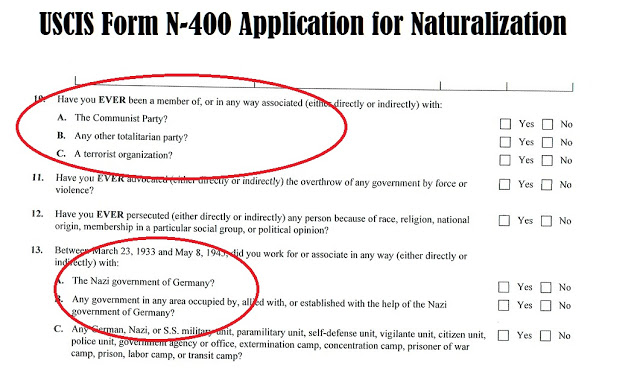Reasons Form N-400 Denied
Many people dream of becoming United States citizens. Some view U.S citizenship as a right. But in truth, it is a privilege. As such, it can be granted, taken away, or simply denied in the first place.
With that in mind, we will take a look at and explain some of the most common reasons why the United States Citizenship and Immigration Services (USCIS) denies applications for naturalization (citizenship).
Official reasons for denial of the Form N-400 or application for citizenship
But before we do, let’s summarize the legal or “official” reasons a USCIS officer can deny an application following the initial naturalization interview. These include the applicant’s failure to demonstrate or otherwise provide acceptable evidence of:
- Lawful entry into the country and official recognition as a legal permanent resident
- Length and location of residence
- Amount of time actually spent in the country
- A clean criminal record
- Truthfulness and ethical conduct
- A firm belief in and willingness to abide by the principles of the U.S. Constitution
- English comprehension
- Knowledge of U.S.history and government
- Willingness to make any additional appearances or furnish additional documents requested by USCIS in order to complete the application
Now, even though we’ve just simplified the “official” language, these reasons — which must be listed on the official notification announcing the denial of an application — may still seem somewhat unclear. So now let’s talk about what this actually means.

Whatever you do, be honest on the N-400 form and in the citizenship interview
Being deceptive — or lying — on any part of an application for citizenship will likely result in denial. Specifically, the chances of USCIS rejecting an application are greater when someone lies about their criminal record (including seemingly “minor” charges, arrests and so forth); reasons for inordinate amounts of time spent outside of the United States following lawful admission; past or current affiliations with or any sympathy towards groups that are hostile to the United States; failure to pay state or federal income taxes; or failure to make required child support payments.
Being dishonest about these matters might not seem like a big deal at the time. However, by knowingly providing inaccurate or misleading information on the application, the applicant demonstrates lack of truthfulness and ethical conduct, which are key requirements for citizenship.
Lying during the actual citizenship interview is also frowned upon. If the USCIS officer conducting the interview determines that an applicant is doing so at the time, the bid for citizenship will be denied. Even it citizenship is granted, it can be taken away (revoked) if USCIS later determines that the applicant lied during the interview.
In any case, honesty is always the best policy — especially because the matter an applicant may be tempted to lie about may not result in automatic denial of his or her application. For example, being convicted of a violent felony — one that results in the death of or life-threatening injury to another person — results in automatic denial of citizenship. Being convicted of a lesser crime can also affect an immigrant’s ability to apply for naturalization, but does not necessarily result in automatic denial of citizenship.
The same is true of failing to pay taxes or child support. If someone who has been admitted to the United States as a lawful permanent resident knowingly, deliberately, fails to pay applicable taxes or make required child support payments, their application for citizenship will automatically be denied. However, if the applicant takes responsibility for his or her actions and demonstrates a willingness to pay what they owe, USCIS may accept the application for naturalization.

Complete the entire application for naturalization and provide the correct supporting documents
Another one of the most basic reasons for denial of citizenship is that the applicant submits an incomplete N-400, provides erroneous or inconsistent information, or provides the wrong supporting documents. Failure to provide any additional information requested by USCIS within a specified time after the naturalization interview may also result in the denial of citizenship.
For these reasons, it is important to consult with or secure the services of an experienced immigration attorney. Specifically, it is crucial to find someone with the knowledge necessary to help fill out the form, identify and address any areas of concern, and identify the proper supporting documents before the application is submitted.
Make sure you are prepared for the citizenship test and interview
U.S. immigration laws mandate that most applicants for naturalization (citizenship) attend an interview that includes assessments of their English comprehension and knowledge of U.S. history and government. The civics portion of the citizenship test includes 10 questions, six of which must be answered correctly in order to “pass.” Failing the civics and/or the English comprehension portion of the citizenship test does not automatically disqualify applicants for citizenship. Instead, USCIS allows applicants who fail during their first attempt to retake the test one more time. Failing the second time will result in denial of the application.
Because applicants only get two shots at passing the test, it goes without saying that being well prepared is extremely important. If you are applying for citizenship, be sure to take advantage of any U.S. citizenship and/or English language classes that are offered in your community.
Know the basic criteria for U.S. citizenship

USCIS will automatically deny an application for naturalization if the applicant is ineligible for citizenship. In addition to meeting the criteria we have already discussed, the applicant must meet the following criteria in order to qualify for U.S. citizenship:
- Be at least 18 when the application is filed.
- Have a Green Card for a legally specified period.
- Establish a physical presence in the United States for a period determined by law.
- Remained in the country without any prolonged absences (as defined by law).
- Live in the same state or USCIS district for a legally specified period prior to filing the N-400.
- Be loyal to the United States and willing to join the armed forces if need be.
As we have often noted, becoming a United States citizen is a long, emotionally and financially taxing process. After an applicant has waited for years and done his or her best to follow all of the rules, even a simple mistake can result in denial of an application for citizenship.
In many cases this isn’t the end of the journey — the applicant can remain in the United States as a lawful permanent resident after USCIS denies his or her citizenship. However, the prospect of reapplying for citizenship can be just as intimidating the second time around.
If you or your relative is applying for citizenship, or if your citizenship application has been denied, and you want to appeal or reapply, we are on your side. Contact us to learn how we can help.
Be aware of any changes in US immigration policy
Our robot will always keep you posted on the Facebook

Usimmigrationforms.com is not a law firm. We do not provide legal advise or opinion to our customers. If you have a complicated case or need to receive a legal advise please consult with an experienced immigration attorney.
Immigration Advocacy Service
Immigration Advocacy Service
With our Attorney Application Review option, you can choose to have an experienced immigration attorney review your application and correct any mistakes.
With our Attorney Application Review option, you can choose to have an experienced immigration attorney review your application and correct any mistakes.
Popular services
Popular services
Category
Category
1
646-838-3958 info@usimmigrationforms.com
646-838-3958
info@usimmigrationforms.com
160 Broadway 4th floor New York NY 10038
160 Broadway 4th floor
New York NY 10038
Follow us
Follow us
Receive the latest news
Receive the latest news
TERMS AND CONDITIONS | PRIVACY U.S. immigration forms is not affiliated with the USCIS or any government agency. We are not a law firm, do not provide legal advice, and are not a substitute for the advice of an attorney. Customer support is for technical and billing issues only, and will not answer legal questions. Some forms that can be completed online using our service are available and come with written instructions for free from the USCIS. U.S. immigration forms purchase price does not include any government application, biometric or filing fees. Access to and use of the usimmigrationforms.com website, as well as all cancellation, termination or refund/return policies, are subject to U.S. immigration forms Terms of Use and Privacy Policy. The “U.S. immigration forms” mark and U.S. immigration forms logo are service marks registered with the United States Patent and Trademark Office under the laws of the United States of America.
0 Comments